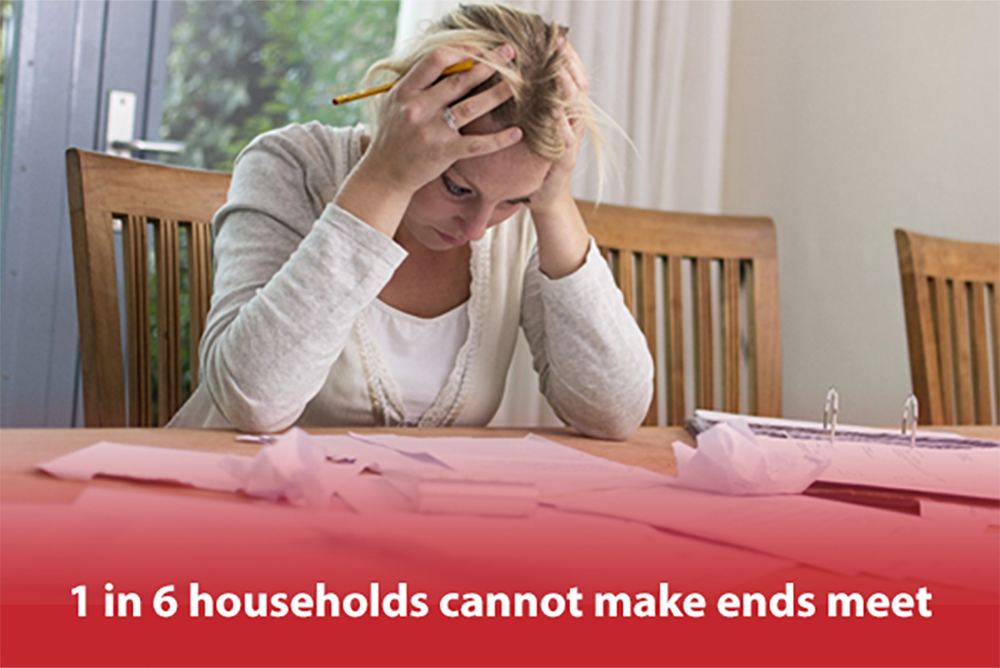"Most people are only a pay cheque away from crisis."
Daphine Aikens, Hammersmith & Fulham Food Bank's fonder
The increase in food banks has been a tragedy. A 2016 study by the Money Advice Service found that 16 million people in the UK had savings amounting to less than £1001. Lacking a safety net means any interruption in pay can turn someone’s life upside down.
In November 2020, The Guardian reported that research conducted before Covid-19 showed most people who used food banks were living below the poverty line. However, the increase in users from a variety of backgrounds is seen as an "indicator of how the pandemic has pushed the cost-of-living crisis further up the income scale."2
This research complements established information on UK food bank use compiled by the Trussell Trust, Britain’s biggest food bank network. According to their 2020 end of year statistics, "a record 2.5 million food bank parcels were given out, a 33% increase on the previous year. 980,000 of these went to children."3
Coming up in Step 4…
The importance of saving
"Do not save what is left after spending, but spend what it is left after saving."
- Warren Buffet
Imagine if your washing machine or your car broke down or if an unplanned bill lands on your doorstep, what do you do? Would you have enough funds to cover it?
We’re constantly told that we need to save money for a rainy day, but if you’re on a low income and you can barely pay your bills, the idea of saving money seems impossible.
Setting aside a little money each month and committing to not spending it is a great start. In fact, if you set up a savings plan, your financial situation is likely to improve in the long run. Try our savings tips below.
TIP: Not sure how much you spend every month? Revisit your BUDGET PLANNER from Step 1 to work out your regular outgoings to pinpoint where you can cut unnecessary costs.
Set up an emergency fund
How much should you save? There’s no definitive amount, but a good rule of thumb is to have at least £500 or ideally three months’ worth of essential outgoings to get you out of any financial scrapes. If you put something away now, you can build your fund over time. It also means you don’t have to rely on debt to pay your way out of an emergency. And because an emergency can happen at any time, quick access is crucial. You should put the money in a separate bank account to prevent the temptation of dipping into your savings.
Make saving a habit
When you reach a reasonable threshold of emergency savings, it’s important to keep saving and making it a habit. A great way to kickstart a long-term savings habit is to set up a cash ISA. A cash ISA (or Individual Savings Account) works like an ordinary savings account except it’s tax-free. Each tax year there is an allowance limit – for 2021/2022 it’s £20,000. So how do you set up a cash ISA? Though it may be convenient to go to your current bank provider, but it might be best to shop around.
Get on the phone
Start calling the lenders and see if they can improve the terms of the debt – can they lower the interest rate or waive late fees? If you have a good credit rating, you may even be able to transfer your balance to a low or 0% deal. Your target is to reduce your APR, so consider consolidating your debt in one loan at an APR lower than any of the current APR rates.
Coming up in Step 5…
Explore what benefits you
Sources:
1 BBC: Millions have less than £100 in savings – 29th September 2016
2Guardian Newspaper: Growing numbers of 'newly hungry' forced to use UK food banks, 1st November, 2020
3Trussell Trust: End of Year Stats, 2020/21








